The 2024 Fisker Ocean Is Not Ready
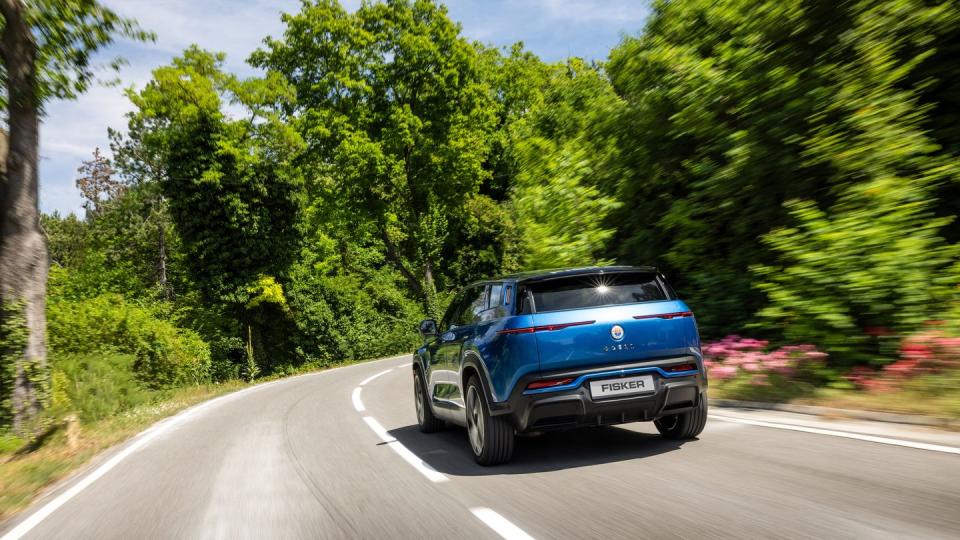
We've always wished Henrik Fisker well. The Danish former Aston Martin and BMW designer seemed better suited to composing cars than the never-simple business of running a car company, much less a startup. Look no further than the ignoble crash and burn of his eponymous first effort, the Fisker Karma. A low and swoopy plug-in-hybrid sedan listing for more than $100,000 over a decade ago, it was poised to drain over $500 million from federal coffers and more than a billion dollars from private investors before it failed to sell in meaningful volume. This led stakeholders, including the feds, to bail and Fisker himself exiting shortly before the company he'd founded plunged into bankruptcy in 2013. A testament to the Karma's good looks, a close relative of that eye-catching first model lives on through the present day as the Karma Revero (nee GS-6), made by Chinese-owned Karma Automotive of Irvine, California. Predictably, its sales pace thus far remains relaxed. Very relaxed.
The good news is that—in a heartwarming testament to the indefatigable human spirit—Henrik Fisker is back with a new venture, Fisker Inc., and a new, all-electric Fisker, the Ocean SUV. Thanks in part to a 2020 SPAC offering that drafted the wild, Covid-era, upward spiral of Tesla shares, the reborn Fisker enterprise's value rocketed skyward out of the box, the company's worth pegged at almost $3 billion before even a single unit was sold. The launch made the designer cum auto magnate personally worth $1.6 billion in 2021, per Forbes. Not bad for a guy who'd sold but 2000 or so cars his last time out and whose new company had at the time yet to sell a single example of anything. However, as in his previous outing, disappointment waited around the next bend. The Ocean has been launched, single-digit-thousands of deliveries have now been made, three future models have been revealed. And yet, as I write, the new company's market cap has sunk to less than $550 million, with shares dropping more than 75 percent in the last year—down to $1.60 and below—from a one-time high of $19.28. More recent estimates place Fisker's personal net worth in the low, mere double-digit millionaire category.
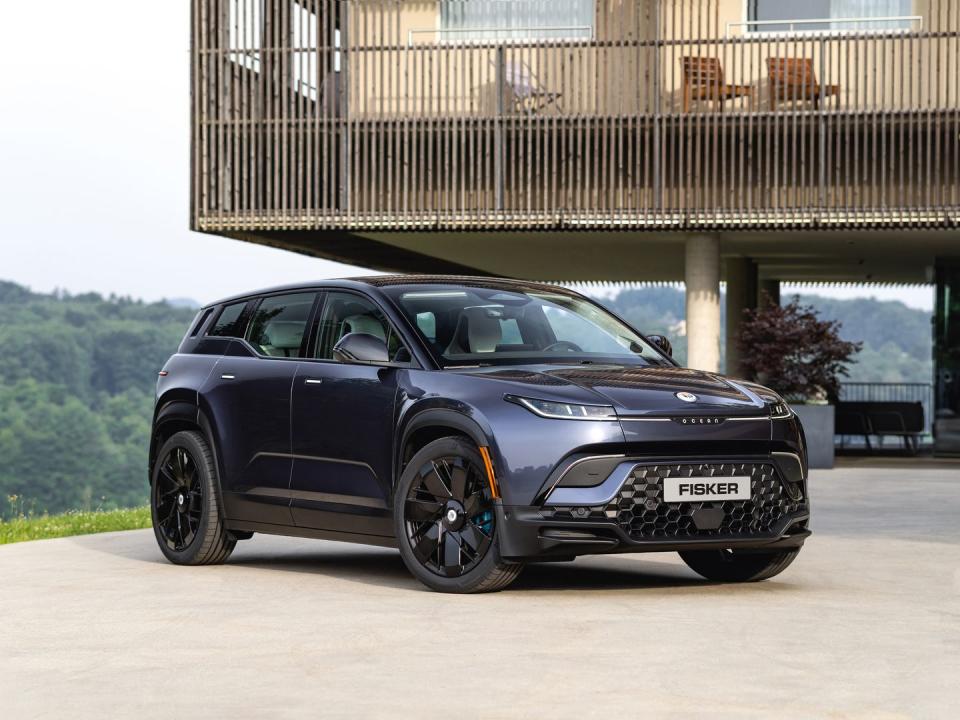
Discouraging, but better than a poke in the eye with a sharp stick, all things considered. It's a brutalizing business. The stock market, like a dope fiend whose dealer skipped town, can't be trusted, and much was beyond Fisker's control. So hopes were high when, in my capacity as a juror for the World Car of the Year awards, I got a chance the other week to spend an unsupervised hour with a production Ocean in Southern California. Initially Fisker had said the Ocean would be built in the U.S. But with development and assembly subsequently assigned to Magna-Steyr—the venerable contract vehicle manufacturer with a plant in Graz, Austria, (and another in China) that has built more than 4 million cars, according to the firm, for many of the world's leading makers, including BMW, Mercedes, Chrysler, Jeep, Jaguar, and Toyota—at least a quality build was assured. Build of what was the question.
I was particularly curious to try the Ocean for two reasons. One, Fisker adopted Magna-Steyr's own aluminum-intensive FM29 EV platform as the basis of the Ocean, and with Magna's repeated expressions of interest in building its own cars one day, the final product would be revealing. (Recently, Austrian newspaper Kleine Zeitung reported a $492 million deal for Magna-Steyr to develop Volkswagen's new electric Scout SUVs.) Closer to home, my local wine merchant, who happily drives a Jaguar I-Pace (one of the few, one of the proud), said the day before I left for California that his lease was expiring soon. He had put a deposit down on an Ocean. Let him know what I thought, he asked, before he pulled the trigger and actually bought (or leased) the Fisker he'd reserved.
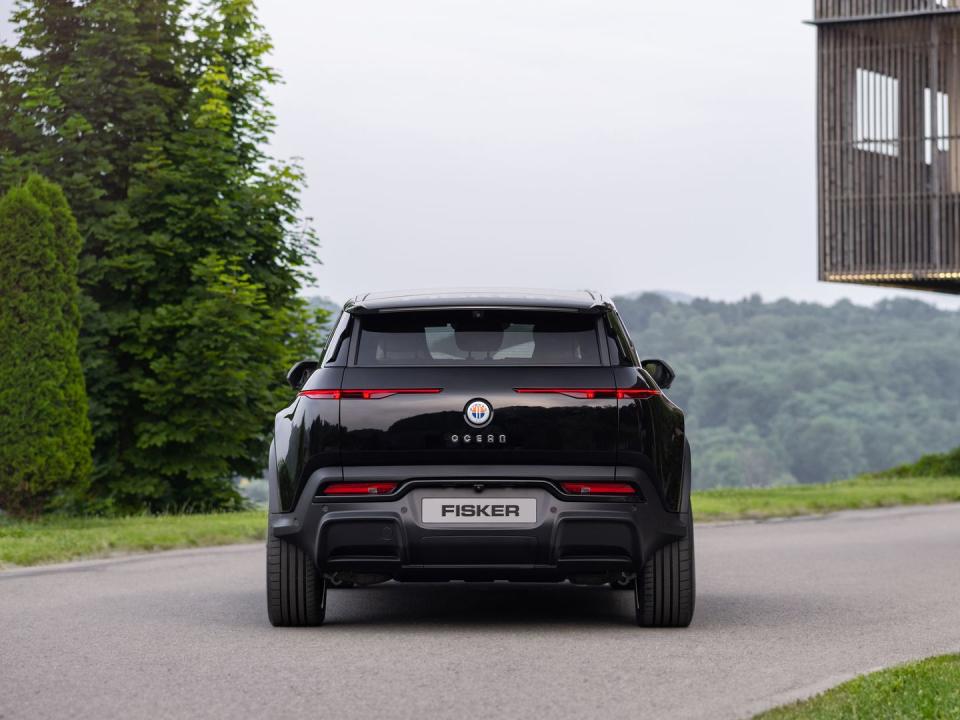
Well, gosh, we hate to be the bearer of bad tidings. But when we next spoke I had to relate the sad, simple truth: The Ocean is not ready for prime time. I like me an I-Pace plenty, but it's old in its design and mechanical particulars, having been tragically starved for attention by its makers. And yet, I can say without exaggeration that the Fisker Ocean is not just a step down from the I-Pace. In many respects, it's floors below, in a second or third sub-basement.
Sure, it's got better range—up to 360 miles with the larger "Hyper Range" battery option in the top-spec Extreme and 350 in midrange Ultra guise. It's got more accelerative ability—a claimed 3.7 seconds to 60 with the "Peak HP" option. All-wheel drive comes standard in the higher-priced Ultra ($52,999 before destination) and the top-of-the-line Extreme model we tested ($61,499 before destination), both less than the Jaguar ($73,275). The front-drive-only Ocean Sport has a considerably lesser range (231 miles) but starts at a more affordable $38,999 before destination. Only the more expensive models have been delivered to date, but a Flexee Lease, which eliminates long-term commitments and includes a 30,000-mile annual driving allowance, sounds like good value, starting at $379 a month, presumably for the model that isn't being delivered yet. The reasonable monthly smacks of either great faith in their product and its future residual values or abject desperation.
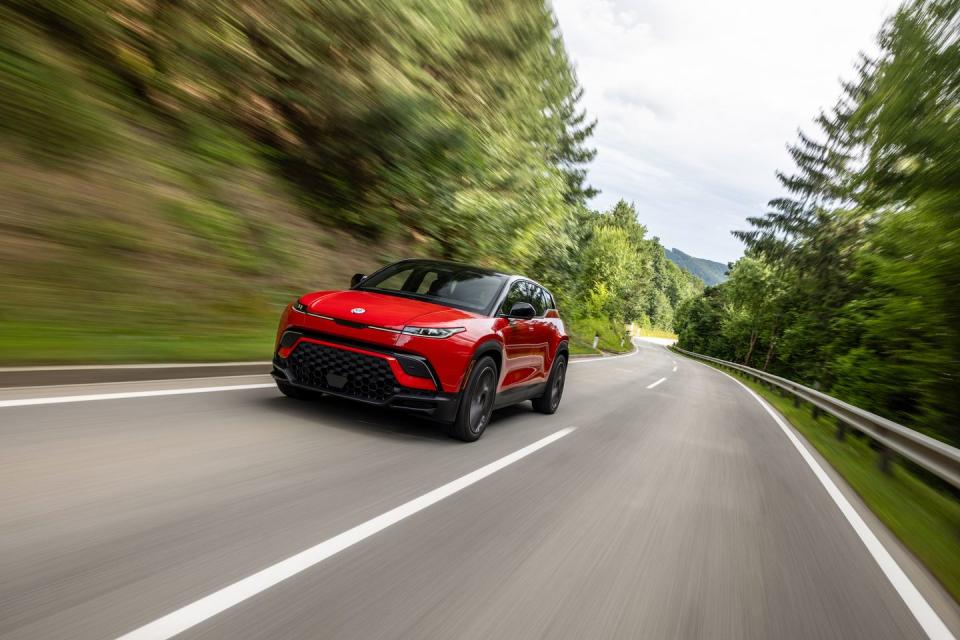
It's no BMW Z8 (our favorite Henrik Fisker design and, we'd wager, an eternal classic), but the Ocean looks good, in a spare if still too anodyne SUV kind of way. Step inside and, like many EVs, it's pleasingly spartan, uncluttered, and crisp, with a big screen centrally located. But something is not right. Many touchpoint pieces feel flimsy and kit-car cheap, notably the indicators, displays, and minor controls. Indeed, they are shockingly of a piece with some of the Chinese imports World Car panelists brought from Mexico for the assembled jurors to sample. Fisker claims to build the "most sustainable SUV on Earth" using "recycled and ethically sourced materials throughout," featuring fabrics like "Alcantara, Ultrasuede, FeelTek, EcoFabric," and "recycled carpeting all made from recycled plastic bottles and other recycled polymers," with "more than 50 kilograms of recycled polymers and bio-based products" on board each Ocean. At the very least, with door panels made of old Pepsi bottles, the Ocean has a good excuse for feeling so cheap.
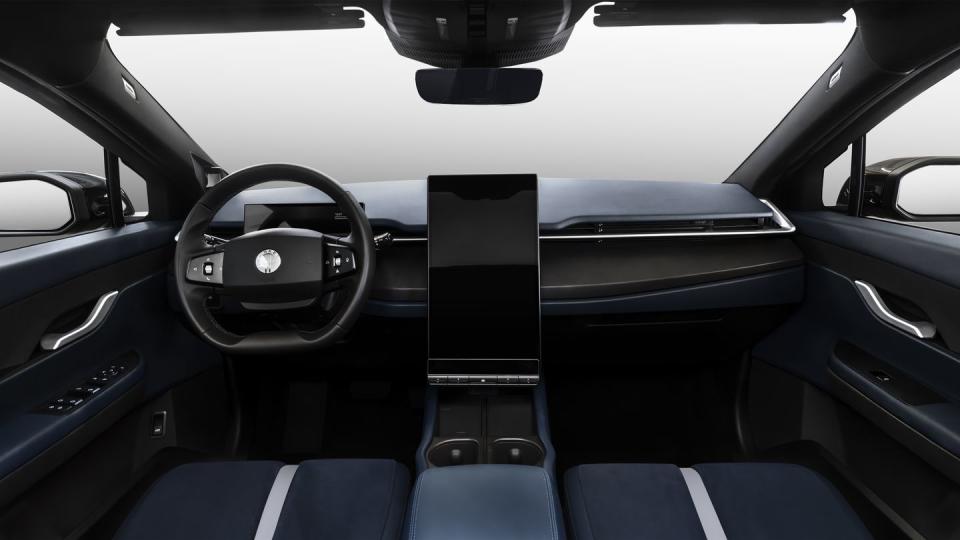
Being electric and all-new, the Ocean had to have a couple of arresting party tricks and so it does. A full-length SolarSky roof helps charge the batteries, delivering owners of its Extreme model up to a claimed 1500 additional emission-free miles per annum (assuming the sunniest conditions) with help from the medium-size star around which we revolve. It was, alas, chilly and raining the day of our drive so it was hard to say how much the full glass roof would affect cabin temperatures on a sunny day.
Then there is that center touchscreen. Of a quality, if not a size, that would not have seemed out of place on a first-generation Lotus Evora, it appeared unremarkable until we were shown how the Revolve rotating screen... revolves. A 17.1-inch touchscreen, it is powered to swivel from vertical Control mode to horizontal, so-called Hollywood mode, with a widescreen format that allows one "to enjoy movies and videos, complete with 360-degree sound, in an immersive cinematic experience," per the press materials.
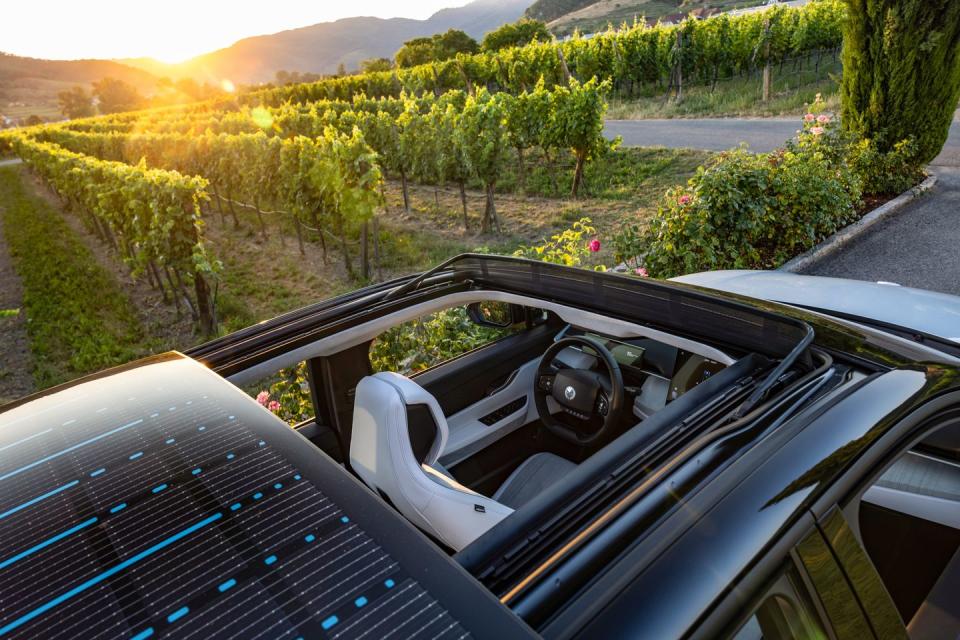
Frankly, we're more than a little surprised by the charitable response some other publications have mustered for this new model following their first exposures. Admittedly, some rode only as passengers, but others did actually drive it and softly voiced their reservations. We'll call it attempted mercy. The ride is notably choppy and harsh, road noise is excessive, and, as noted, controls have a decidedly low-grade feeling. How did I know all this? Because I got out of the electric Hyundai Kona and the Ioniq 5 N and the electrified Genesis GV70 shortly before driving the Ocean. Any one of them mopped the floor with it. Just as with the Dodge Omni GLH (whose best-in-class 0–60 times did not make it the winner of 1980s comparos, angering some readers), there is so much not right about the Ocean that it is eligible for the participation prize only.
When I got home, I read more about the new company's travails of late, which have not been inconsiderable. Around the time of my test drive, Fisker announced that it would not meet sales projections for 2023, saying that its delivery infrastructure could not keep up with orders. The company, which does not have dealers and sells direct to consumers, blamed logistics failures, revealing in its third-quarter earnings report that it has cut production estimates for the year from 20,000–23,000 to 13,000–17,000 to reduce—it said—inventory it can't deliver in a timely fashion. How does that work? Meanwhile, Fisker further revealed that it had to let its chief accounting officer go for weak internal controls, which resulted in a delay of its quarterly financials. Yipes.
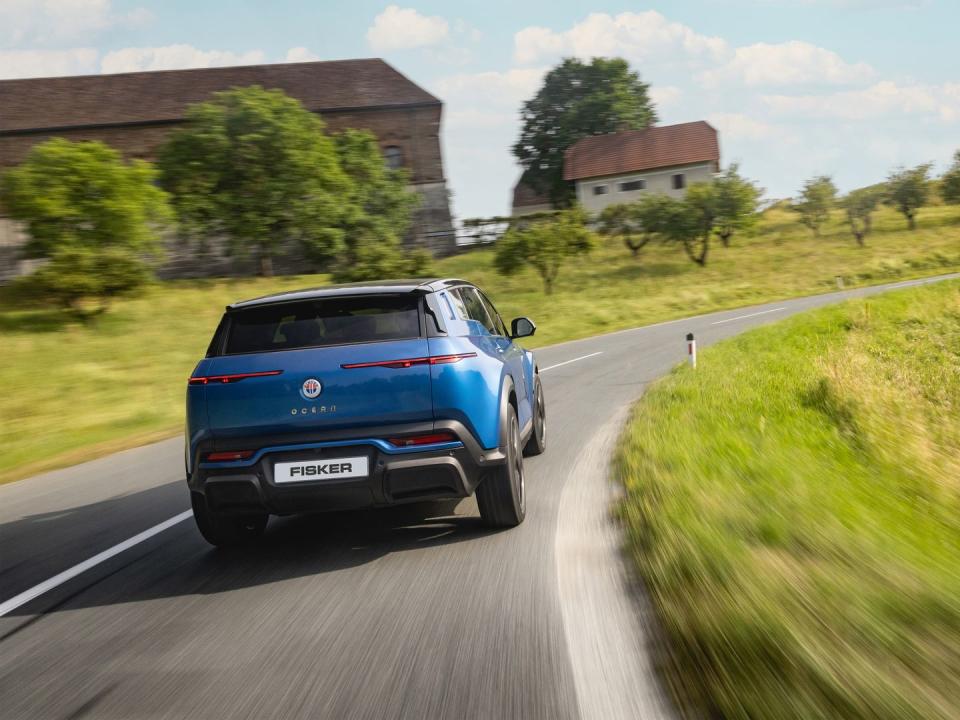
We're still pulling for Fisker in the way that we root for all new companies who propose to bring something new to the game. It's also exciting to see a new electric contender enter the market at a more-affordable level. But the indications of long-term success here are striking us as hard to identify.
Still want an electric car and can't stomach a Tesla? Go buy a Kia, Hyundai, or Genesis. Or a Volkswagen, BMW, or Mercedes. Or a Chevrolet or Ford. Or a Rivian or a Lucid. Frankly, anything would be a better car and a more prudent investment. Even a Jaguar I-Pace.
You Might Also Like

 Yahoo Autos
Yahoo Autos 